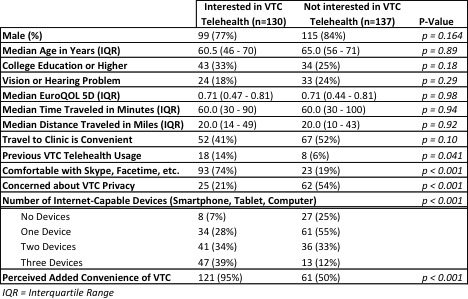Session Information
Date: Tuesday, October 23, 2018
Title: Patient Outcomes, Preferences, and Attitudes Poster II: Patient Perspectives
Session Type: ACR Poster Session C
Session Time: 9:00AM-11:00AM
Background/Purpose: Video Teleconferencing (VTC) telehealth is a synchronous medium in which patients may interact with physicians using their own personal electronic device or at a designated remote clinic site. We evaluated the attitudes and interest toward VTC telehealth at two Veteran Affairs (VA) rheumatology clinics.
Methods: Adult rheumatology patients were approached during return clinic visits at the VA Greater Los Angeles Healthcare System to participate in a descriptive survey. The paper survey assessed electronic health literacy, previous VTC and other telehealth use, current barriers to accessing in-person rheumatology care, concerns about VTC telehealth, and perceptions of telehealth. These were rated on a 5-point Likert scale. The validated EuroQOL-5D-3L evaluation was included to assess self-rated quality of life. Patients rated their interest in VTC telehealth as a substitute for some in-person rheumatology clinic follow-up visits on a 7-point Likert scale. Fisher’s exact test and Kruskill-Wallis testing was used for univariate analysis for categorical and continuous variables, respectively. Ordered logistic regression was used to analyze variables associated with interest in VTC telehealth.
Results: 337 patients were approached to take the survey and 267 (79%) patients agreed to take it. 130 (49%) respondents expressed interest in VTC (defined as 5+ on a 7-point Likert scale). We found interest in VTC telehealth to be associated with the number of electronic devices owned (OR: 1.38, 95% CI [1.05, 1.81], p=0.022), comfort using videochat technology such as Skype or Facetime (OR: 5.06, 95% CI [2.84, 9.00], p<0.001), and perceived added convenience with adoption of VTC telehealth (OR: 9.70, 95% CI [5.25, 17.95], p<0.001). Patients with concerns about privacy were less likely to be interested in VTC telehealth (OR: 0.38, 95% CI [0.22, 0.65], p<0.001). We found interest in VTC telehealth not to be associated with age, self-rated quality of life, education, or time/distance traveled to clinic.
Conclusion: VA patient interest in utilizing VTC telehealth as a substitute for some follow-up rheumatology appointments was found to be correlated with the number of electronic devices owned, comfort using videochat, and perceived ad convenience. This interest is inversely associated with concerns about potential privacy issues. Interest in VTC telehealth is not associated with distance/time required to travel to clinic nor perceived inconvenience of travelling to clinic, though the study may not be powered to evaluate this.
To cite this abstract in AMA style:
Zhang D, Lu J, Aquino- Beaton C, Harada N, Fang MA. Attitudes Toward Telehealth Video Conferencing Among Patients with Rheumatic Disease [abstract]. Arthritis Rheumatol. 2018; 70 (suppl 9). https://acrabstracts.org/abstract/attitudes-toward-telehealth-video-conferencing-among-patients-with-rheumatic-disease/. Accessed .« Back to 2018 ACR/ARHP Annual Meeting
ACR Meeting Abstracts - https://acrabstracts.org/abstract/attitudes-toward-telehealth-video-conferencing-among-patients-with-rheumatic-disease/

